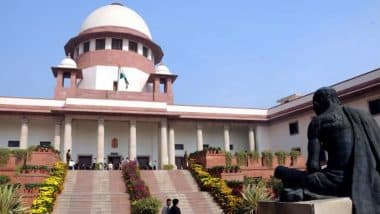New Delhi, December 24: While no amount of money or other material compensation can erase the trauma and suffering that a victim undergoes after a serious accident, monetary compensation assures restitution, the Supreme Court has said. A bench of justices Krishna Murari and S Ravindra Bhat said taking the type of disability into concern, just compensation should be awarded to the person aggrieved.
"Whilst no amount of money or other material compensation can erase the trauma, pain and suffering that a victim undergoes after a serious accident, (or replace the loss of a loved one), monetary compensation is the manner known to law, whereby society assures some measure of restitution to those who survive, and the victims who have to face their lives," the bench said.
The observation from the top court came while awarding a compensation of Rs 9.30 lakh to a woman labour who was injured during construction of government hospital at Bidar in Karnataka. Supreme Court Notice to Centre on Plea Seeking Caste-Based Census for OBCs.
On July 22, 2015 , the appellant fell down from second floor to ground floor when the centering plate collapsed on her head. The top court noted that the doctors who treated the appellant have held that she sustained fracture of spinal bone and compound fracture on various parts of the body.
The apex court said ideally, the compensation should be provided to the employees against the hazards of employment to which an employee is exposed.
"This also includes any occupational disease or industrial accident that the employee may encounter arising out of or during the course of employment which leads to disability or death," the bench said. Supreme Court Clears 6,844 Cases Since DY Chandrachud Assumed Office As 50th Chief Justice of India on November 9.
"The position of the appellant after the accident, incapacitated her from carrying out her vocation as a labourer, we are of the opinion that the impugned order passed by the High Court is not liable to be sustained. "The functional disability of the appellant is liable to be assessed as 100 per cent and, accordingly, the compensation is to be determined," the bench said.













 Quickly
Quickly



















